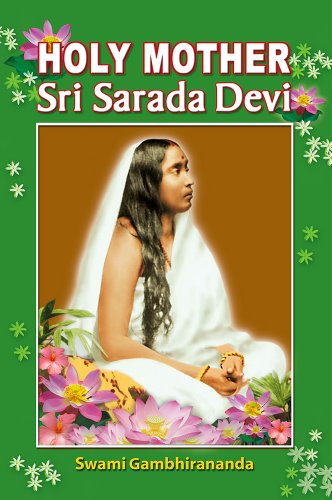
Recently, I have finished this book (Holy Mother Sri Sarada Devi) on the life of Sri Sarada Devi by Swami Gambhirananda. Oh! I just forgot to mention that I am a staunch follower of the Ramakrishna Movement and a voracious reader of Ramakrishna-Vivekananda Literature. Before introducing the concerned person from the book, I should inform my readers a little about Sri Ramakrishna.
Sri Ramakrishna, or lovingly addressed as Thakur, is considered an incarnation of Lord Vishnu by millions of devotees worldwide. Now, let us check some stats from the Vedas, Puranas, and other Hindu mythological scriptures. With every advent of Lord Vishnu, his Shakti (as put forth) comes in some form of the other. The position of Mother Sita to Lord Rama, as Radha to Lord Krishna, similarly, Sri Sarada Devi was to Sri Ramakrishna Paramahamsa, the divine couple for the redemption of the devotees in the age of Kali.
In Gita (Verse 3.21), Sri Krishna tells Arjuna that the actions of great men lead the commons to follow in their footsteps. Further, whatever standards they set by exemplary acts, all the world pursues. In Srimad Bhagavatam, Sri Krishna, while teaching Uddhava (in Uddhava – Gita), says, whenever the lord incarnates as a human, he has to undergo all sorts of problems that a mortals face like pain, disease, agony, and even death.
This book, Holy Mother Sri Sarada Devi, is the most extensive, knowledgeable biography on Sarada Devi, written by one of the presidents of the Ramakrishna Order, Revered Swami Gambhiranada Ji Maharaj. The book beautifully depicts the life of the Holy Mother along with glimpses of her eternal glory from time to time. Even though the Holy Mother was God incarnate, she had to face countless troubles, shackles of society, ruthless behavior from ignorant village folks, and infinite common household problems. Yet nobody could deprive her of what she was.
The divine consort of Sri Ramakrishna, Sri Sarada Devi, is more commonly called the Holy Mother. She was born of poor but pious parents on 22nd December 1853, in a remote village of West Bengal, Jayrambati. She was married to Sri Ramakrishna at the early age of six. The Holy Mother had the chance of coming in close contact with Sri Ramakrishna only in 1867. Sri Ramakrishna took her under his training and by degrees lovingly imparted to her a thorough knowledge of the human character.
Also, he taught her how to live in complete resignation to God. He worshipped her as the Divine Mother. He said that she and the Mother Kali (the chosen deity of Sri Ramakrishna in his human form) in the temple (Kali Temple by Rani Rasmani, Dakshineshwar) were the same, awakened in her the emotions of divine, Godly motherhood to all creatures. The account of her simple, austere life, self-effacement, and motherly love to one and all is unique in its way and surpasses all examples. With her affection, the Holy Mother was an endless solace to all the wounded hearts that explored refuge in her feet for eternal peace and liberation from the worries and anxieties of worldly life. She was perfect in all sense.
She had perfected her roles as a devoted wife, perfect sanyasini, loving mother, ideal teacher, and embodiment of kindness. Sri Ramakrishna used to refer to the Holy Mother as the final ideal of Indian womanhood. After the departure of Sri Ramakrishna from the mortal realms, she was the one who took the reigns of the “young Ramakrishna Order” in her hands. It is why she is also called “Sangha-Janani” or “The Mother of the Order.” She took the responsibility of looking after Sri Ramakrishna’s spiritual children, and steadily, the great Ramakrishna Math and Mission grew up around her. The Holy Mother left the earthly realm on 20th July 1920, at Calcutta.
Her life was the home of compassion. She was the supreme Goddess of wealth. She never said “No,” in granting refuge at her lotus feet. The bounties of the Holy Mother are endless, and I have learned so many valuable lessons for practical implementation in life. It is a firm conviction that to change our lives, positively; we should imbibe at least a few of her endless teachings. Now, let us see the life of Swami Gambhirananda, the great soul who has documented this book.
At the helm of the Ramakrishna Order, Swami Gambhirananda was the 11th president of the Ramakrishna Math and Mission.
After graduating from Scottish Church College, he joined the order in 1923. He held several posts in different centers of the order. He was an erudite scholar. Other than the detailed biography of Holy Mother, he has several spiritual works of literature under his belt (including numberable translations).
To summarize, my journey with this book was fantastic. Besides extensive spiritual learning, I learned several things – old traditions of India, the condition of the villages in the 1900s, the oppressions of the society, the rule of superstitions, and other cultural heritage of India. I can positively recommend this book to everyone (no particulars) to learn the art of living from such an esteemed soul, Sri Sarada Devi.
By Puneet
Write and Win: Participate in Creative writing Contest & International Essay Contest and win fabulous prizes.
